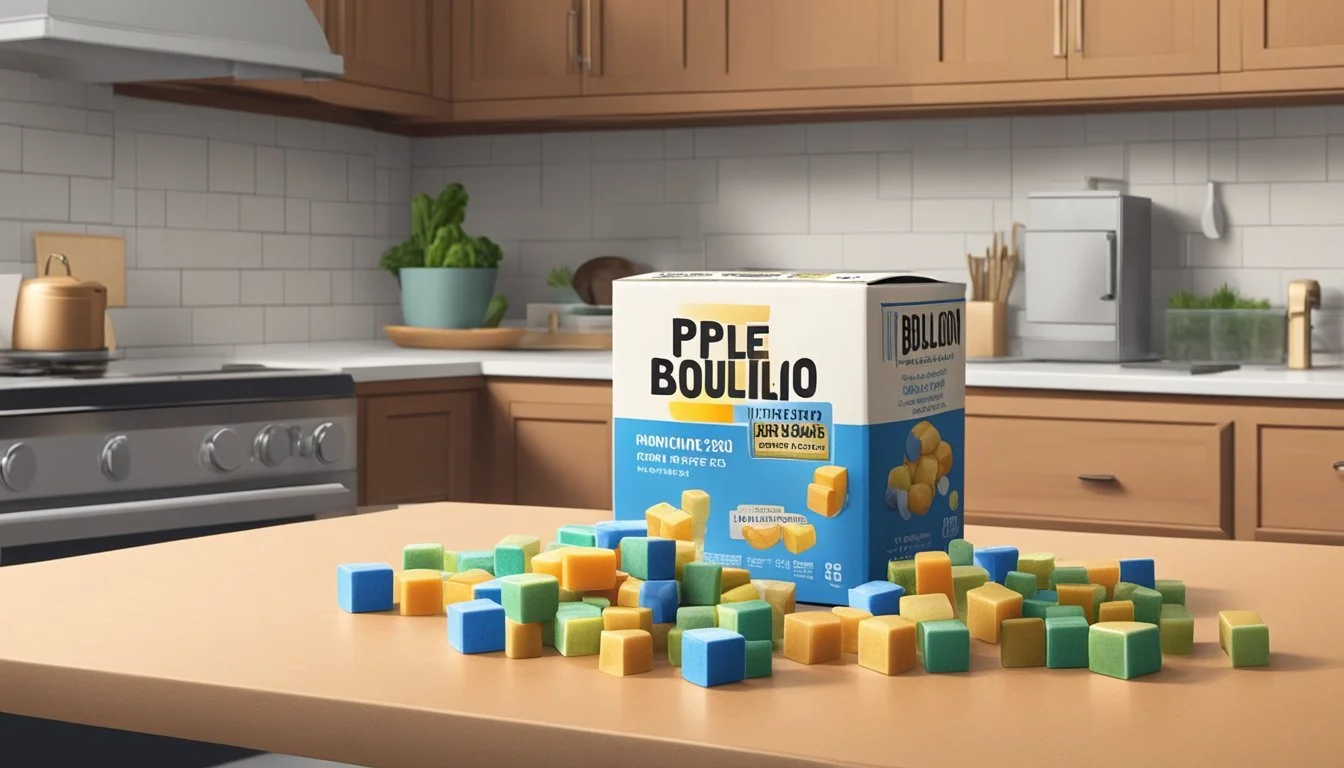Is it Safe to Use Expired Bouillon Cubes?
Understanding Shelf Life and Safety
When it comes to cooking, the use of bouillon cubes is a common practice to enhance flavor in a variety of dishes. These concentrated blocks of dried broth or stock are a staple in many pantries due to their convenience and long shelf life. However, concerns arise when cooks encounter bouillon cubes that have surpassed their expiration date. The safety and quality implications of using expired bouillon cubes become a point of debate among home cooks and professionals alike.
Bouillon cubes are designed to be shelf-stable, with an expiration date that often extends years beyond their production date. This is primarily due to their low moisture content and high levels of salt, which are natural preservatives. While they do not spoil in the same manner as fresh produce or dairy, the quality of bouillon cubes can deteriorate over time. This is manifested in a loss of flavor potency and potential changes in texture.
It is generally recommended that bouillon cubes should be stored in a cool, dry place to maximize their shelf life and maintain their quality. Once a bouillon cube's expiration date has passed, it does not suddenly become unsafe to consume, but rather there may be a gradual decline in taste and aroma. Users should evaluate the cubes for any signs of spoilage such as an off smell or any visible mold before use. Ensuring proper storage and using sensory cues to assess quality helps to determine if the cubes are still suitable for enhancing one's culinary creations.
Understanding Bouillon Cubes
Bouillon cubes are a concentrated source of flavor often used in cooking to create broth or enhance the taste of a variety of dishes. They offer a convenient method for incorporating complex flavors and are available in several varieties.
Definition and Types
Bouillon cubes are compact, solid cubes designed to dissolve in hot water, creating an instant broth. They come in various types, often mimicking the flavor profiles of different bases:
Beef bouillon: Intended to resemble beef stock, often incorporating dehydrated beef or beef flavoring.
Chicken bouillon: Made to imitate chicken stock with ingredients like chicken fat or extract.
Vegetable bouillon cubes: A vegetarian option using dehydrated vegetables, herbs, and sometimes, yeast extract to offer a meat-free flavor alternative.
Components and Additives
The primary ingredients in bouillon cubes can vary based on the flavor but generally include:
Meat-based bouillon: Dehydrated meat, fats, salt, and sometimes a small quantity of dehydrated vegetables.
Vegetable bouillon: A mix of dehydrated vegetables such as carrots, celery, and onions alongside herbs and spices.
Additives and preservatives are often included to enhance flavor and increase shelf life:
Flavor enhancers: Monosodium glutamate (MSG), yeast extract, or other flavorings can be added to amplify the taste.
Preservatives: Chemical preservatives ensure the cubes maintain their quality over time.
Bouillon cubes may also contain spices, herbs, and additives catering to different dietary preferences:
Vegan/vegetarian cubes: Specifically designed not to contain any animal products.
Conventional cubes: May include a variety of additives to mimic specific meat flavors.
Careful reading of labels is advised for individuals with dietary restrictions or allergies.
Shelf Life and Expiration
When discussing the use of bouillon cubes, understanding their shelf life and the significance of expiration dates is critical for maintaining quality and safety.
Expiration Date Significance
The expiration date on a package of bouillon cubes serves as a guideline for when to use them to ensure the best taste and quality. While bouillon cubes do have a declared expiration date, they often remain safe to consume beyond this point, although their optimal taste may gradually decline. One should use bouillon cubes:
Within 6 months to 1 year past the printed expiration date for maintaining flavor.
Taking note if the product’s taste, smell, or appearance starts to alter, indicating that it might be time to discard them.
Shelf-Stable Characteristics
Bouillon cubes are known for their shelf-stable qualities, which contribute to their longevity. To maximize their shelf life, one should:
Store bouillon in a cool, dry area away from moisture and heat sources.
Proper storage can maintain cube's best quality for about 2 years after purchase.
Their dehydration and compact nature allow bouillon cubes to last significantly longer than many other food products even after their expiration dates, providing they are stored correctly.
Storage Recommendations
To maintain quality and extend the shelf life of bouillon cubes, proper storage is essential. By adhering to ideal storage conditions and understanding the effects of improper storage, one can safely use bouillon cubes even beyond their expiration dates.
Ideal Storage Conditions
Storage Location: Bouillon cubes should be kept in a cool, dry place such as a pantry or kitchen cabinet. This environment helps prevent the cubes from absorbing moisture and becoming clumpy or moldy.
Temperature: A consistent, cool temperature is preferable.
Container: Store the cubes in an airtight container to protect them from air and moisture, which can spoil the cubes. If the original packaging isn't resealable, transferring to a container with a tight-fitting lid is a good practice.
Effect of Improper Storage
Humidity and Heat: Exposure to high levels of humidity or heat accelerates the degradation process, affecting the cubes' flavor and potentially causing spoilage.
Direct Sunlight: Storing bouillon cubes in an area where they're subjected to direct sunlight can lead to deterioration in quality.
Odors: Bouillon cubes can also absorb strong odors, so it's important to store them away from foods with powerful scents.
By following these storage recommendations, users can ensure the longevity and quality of their bouillon cubes.
Identifying Spoilage
When determining the safety of expired bouillon cubes, one must be aware of spoilage indicators, which include changes in visual appearance, smell, and texture.
Visual and Olfactory Indicators
Bouillon cubes should be inspected for any color changes or the presence of mold growth, which are clear visual signs of spoilage. The development of odd colors, such as green or black spots, may suggest mold. Additionally, any foul odor emanating from the cubes indicates spoilage and one should not use the product.
Texture and Consistency Changes
The texture of bouillon cubes can be a *tell-tale sign of spoilage. They should typically be solid with a slight crumble under pressure. If the cube has become overly soft or excessively crumbly, it may be an indication that the cube has been compromised. Similarly, if the cube feels moist or sticky, spoilage may have occurred, and it is advisable not to use them.
Food Safety Considerations
When considering the safety of using expired bouillon cubes, it is essential to distinguish between the potential risks and the methods for evaluating if the product is safe to consume.
Risks of Using Expired Cubes
Expired bouillon cubes may deteriorate in quality and lose flavor over time; however, they generally present minimal food safety concerns due to their low moisture content and high salt concentration, which inhibit the growth of harmful microorganisms. Despite this, the cubes should not be considered completely risk-free, especially if the packaging is compromised, which could expose the cubes to moisture and lead to a foodborne illness.
Safe Consumption Evaluation
To evaluate the safety of expired cubes, consumers should perform a taste test and inspect for any visible signs of spoilage such as mold, off-odors, or a change in color. If the bouillon cube passes these tests, it is likely safe to consume from a food safety standpoint. As a precaution, individuals with compromised immune systems should avoid consuming expired food products due to heightened health risks.
Maximizing Bouillon Cube Use
When it comes to bouillon cubes, ensuring they remain fresh for as long as possible and finding suitable applications after their prime are critical for getting the most out of this kitchen staple.
Extending Bouillon Cube Life
Proper storage is key to extending the life of bouillon cubes. Storing them in a cool, dry place, such as a pantry or cabinet, shields them from moisture and temperature fluctuations. For optimal freshness, one should consider placing them in a tightly sealed container which minimizes exposure to air.
Refrigeration may slightly prolong a cube's useful life, though it is not typically necessary.
Use of a freezer is generally not recommended, as it does not significantly extend their shelf life beyond that achieved by dry storage.
Alternative Uses for Expired Cubes
Even beyond their expiration date, bouillon cubes still have utility. While the freshness of their flavor may decline, they can still impart depth to soups, stews, and sauces. One can also create a mild broth for cooking grains or legumes, adding a subtle taste without overpowering the dish with saltiness, especially if using low-sodium options.
Mixing crushed cubes with fresh ingredients like herbs can create a rub for meats.
As a gardening tip, expired cubes dissolved in water can sometimes be used as a fertilizer for plants that thrive with a boost of sodium-based nutrients.
Cooking with Bouillon Cubes
Bouillon cubes are a compact seasoning solution that add a rich base of flavor to various dishes in the culinary realm.
Culinary Applications
Bouillon cubes serve as a convenient substitute for homemade stock, providing the foundational flavor for a myriad of recipes. They are frequently used to enhance the taste of soups, sauces, stews, and gravies. The versatility of bouillon cubes makes them a staple in both home and professional kitchens. Their ability to impart a savory depth to dishes is particularly prized where a rich stock base is required but not readily available. A single cube can typically season one cup of water, effectively transforming it into a flavorful broth.
Common dishes that benefit from the addition of bouillon cubes include:
Soups: From classic chicken noodle to hearty vegetable.
Sauces: Elevates the taste base of both meat and vegetarian sauces.
Stews: Adds complexity and a robust aroma to beef, chicken, or veggie stews.
Gravies: Enhances the savory notes when mixed into meat drippings and thickened.
Flavor Preservation Techniques
The intensity of flavor that bouillon cubes bring to dishes can diminish over time, particularly as they approach or pass their expiration date. Maintaining their flavor potency is crucial for high-quality cooking results. For this reason, proper storage is key. Bouillon cubes should be kept in a cool, dry, and dark environment. The original packaging often provides adequate protection, but transferring them to an airtight container can further extend shelf life by keeping moisture and contaminants at bay.
Effective storage practices include:
Location: A pantry or cabinet away from heat sources.
Packaging: An airtight container or sealable plastic bag.
Desiccants: Including a small desiccant packet can help absorb moisture.
By adhering to these techniques, chefs can ensure that the bouillon cubes retain their aroma and taste, and can still bring a rich, flavorful dimension to any recipe.
Conclusion
Expired bouillon cubes pose minimal health risks but can experience a decline in flavor and nutritional value. The general guideline suggests that bouillon cubes are safe to use 1 to 2 years past their expiration date if they've been stored properly—in a cool, dry place, away from sunlight.
Taste Test: Before using, one should perform a taste test; if the flavor has significantly deteriorated, it is best to dispose of the cubes.
Storage Conditions: The longevity of bouillon cubes is closely tied to storage conditions. A pantry away from heat sources is ideal.
Labeling: It is recommended to label bouillon cubes with their expiration date to track their potential usability period.
Quality Over Time: Be aware that the flavor and potency will diminish over time, and eventually, the cubes will reach a point where they no longer contribute the desired taste to dishes.
For those concerned about safety and quality, it is reasonable to replace any bouillon cubes that are significantly past their expiration date. In summary, while it is safe to use bouillon cubes after their expiration date within a reasonable time frame, the user should exercise good judgment and check for any signs of spoilage before culinary use.





